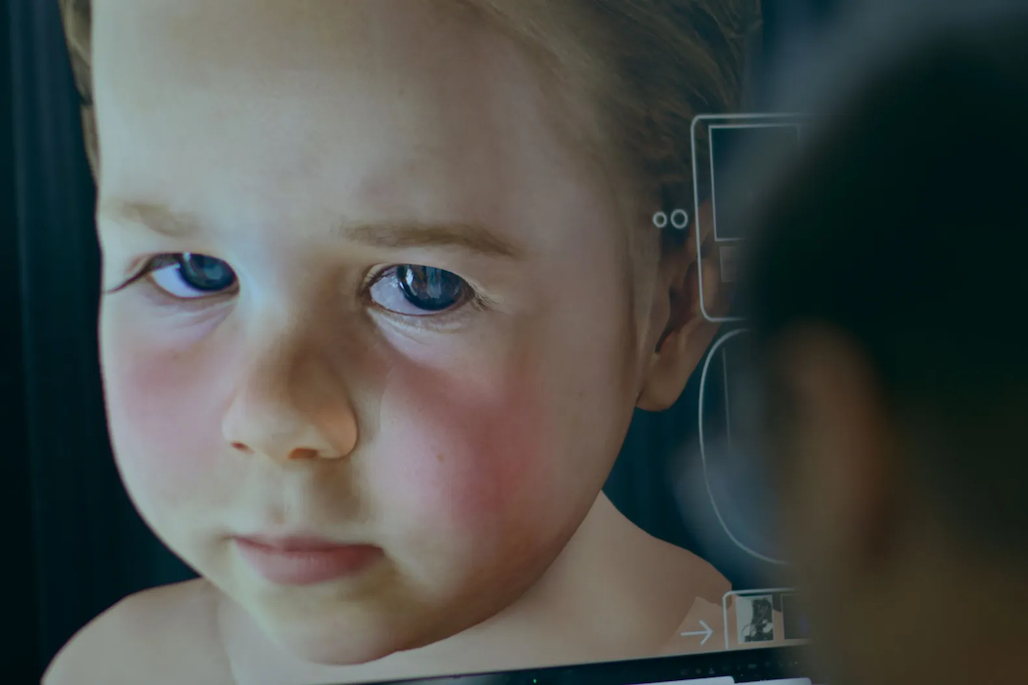
In the documentary "Eternal You," companies use artificial intelligence to create avatars intended for users to simulate talking with loved ones who have died. (Courtesy of Konrad Waldman/Sundance Film Festival)
"Eternal You," created by Hans Block and Moritz Riesewieck, was the last film I watched at the Sundance Film Festival this year, where it premiered. Sitting in the comfort of my couch in Madrid, I caught the film in the early hours of a chilly Monday, where due to the time difference of the online press screenings, I was left in a strange haze, a limbo of sorts. Quite appropriate that the documentary is about the growing industry of the digital afterlife, where artificial intelligence uses texts, social media profiles, images, videos and other elements to create functioning avatars meant to extend the lives of dearly departed ones for as long as the cloud exists.
Block and Riesewieck's approach aims for impartiality as they interview the CEOs and tech folks behind companies like Project December, which boasts having "one of the world's most sophisticated super-computers," enabling it to simulate a text-based chat with anyone dead or alive. The filmmakers also include opinions from ethicists and sociologists like Sherry Turkle — an MIT professor who suggests this industry is promising what religion has been unable to deliver — and Sara M. Watson, a tech critic and analyst who warns that our current knowledge of AI is too limited.
Some people are using AI avatars to cope with grief, like a woman who creates a digital version of her late father so her children can know their grandpa. Most heartbreaking of all is a South Korean woman preparing to appear in "Meeting You," a TV documentary where she will meet a virtual reality version of the young daughter she lost.
While Scripture assures us resurrection and life through our belief in Jesus Christ, the "end of times" when we all shall reunite has no set date. Neither does the time and place where we shall die.
After screening "Eternal You" I got the news that a college classmate had passed away suddenly at age 40. I instantly saw his face in my mind as my friend called me to share the news. My brain left our conversation and began to put together the pieces of him that lived within my memory, while my friend on the phone went on and on about how she found out and how others were reacting. In my mind's eye I saw him raising his hand in class, walking to grab a drink at a pub and widening his mouth to smile.
Raising, walking, widening. Life.
My friend texted me a recent picture of him. In it, he looks slightly older than the last time I saw him, but that picture is now the one fixed in time. Death.
Advertisement
I'm 37, and I've certainly lost people I loved; most notably, both of my grandmothers within a year of each other, leaving my parents as the new elders. And now, not knowing what else to do with the ache and emptiness I felt over the loss of an old friend, I immediately sought my parents' wisdom.
My father recommended Scripture, a psalm or two would get the job done. If all else failed, an extra dose of my anxiety medication should be enough. I took two extra doses and couldn't sleep for two days.
My mother, much less pragmatic and eschewing practicality, sat with me on the phone for over five hours. She had no wisdom to dispense, she said, all she had were stories about her own grief, the initial shock of learning her oldest brother had died by suicide, the fear she felt when she knew her father's cancer would be his end, and the tears she had to swallow in a hospital as the doctor told her to put on a strong face for her mother, who would never get up from the bed.
As one of the experts in "Eternal You" points out, it might not be death that's the issue, but how poorly we deal with grief.
I had no idea what to do with mine, and neither did anyone else around me. My friends grew weary of listening to me tell them how much I loved them and beg them not to die. My brother asked if I needed to visit a psychiatric facility. No amount of comfort food, whiskey or prayer eased the vacuum inside my chest, which seemed to become more potent with each passing day.
As one of the experts in "Eternal You" points out, it might not be death that's the issue, but how poorly we deal with grief.
I understood the South Korean mother willing to hug emptiness while wearing a VR headset. But I also understood 1 Corinthians 15:47, "The first man was of the earth, made of dust; the second Man is the Lord from heaven."
On my fifth day of grieving, no longer wishing to impose my pain on others, I went to ChatGPT and asked, "What happens when we die?" I chuckled at the non-answer I received:
Ultimately, the question of what happens when we die remains unanswered and may always be a matter of personal belief or speculation, as it lies beyond the realm of empirical observation and scientific inquiry in its current form.
The more I pushed, the more ChatGPT strayed from delivering what I thought I needed. I even thought I perceived the chatbot's frustration, but how could a machine deliver emotion? Even I know better than that. But somehow, having some answer at all delivered comfort, in the same way the VR headset did the South Korean mom, in the same way the virtual grandfather brought a smile to his daughter's children.
I wish I had something smarter to say about grief, or proclaim that I feel like a "new man" on what feels like the other side of mourning. For now, I offer the gift ChatGPT bestowed on me, when I finally gave up and asked what I knew it could deliver: A prayer for someone we expect to meet in the new creation:
Give us the strength to carry on in [name]'s absence, to cherish the memories we shared, and to live our lives with kindness, compassion, and love, honoring [name]'s legacy in all that we do.
May the [name] in your lives also live on eternally.






